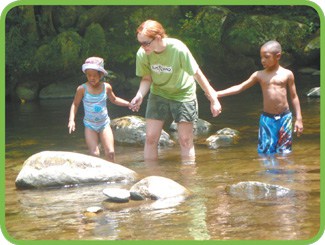by Jennie McGuigan – School Programs Coordinator at Great Smoky Mountains Institute at Tremont
Emerald Youth. Photo credit: Michaela Pruitt
As School Program Coordinator at Tremont, and a parent of two, I think often about the quality of the time parents spend with their children and the role nature can play in the development of parent-child relationships. Ron Swaisgood, biologist and cofounder of Family Adventures in Nature reminds us that, “nature can be co-experienced by parent and child in ways that Chuck E. Cheese’s just can’t.”
Now first, let me preface by saying that, I have nothing against Chuck E. Cheese, or other kid-centered destinations that have all the bells, whistles and other sensory stimuli. These places provide opportunities for children and their friends and family to experience fun together, share laughs, and make memories.
I found some thoughtful answers to my reflections about families spending time together in nature in a couple of publications: Together in Nature: Pathways to a Stronger, Closer Family, by the Children & Nature Network, and in Richard Louv’s, Last Child in the Woods: Saving Our Children from Nature Deficit Disorder. They maintain that, “strong early bonds with parents, grandparents, and caregivers help children feel a sense of trust and confidence throughout their lifetimes.” However, this can be difficult for some families because, “…nurturing those bonds requires things that are often in short supply in today’s world: time to slow down, focus, and block out the distractions of cell phones and other electronic devices; patience to listen and respond thoughtfully to a child’s needs and comments; and the capacity to keep daily stress in check enough to enjoy life’s small and great shared moments.”
“Nature can offer solutions on many levels. Nature doesn’t have deadlines or ring tones. You can reach it without spending a penny.”
The writers suggested that the solution could be boiled down to three main categories: Being more available to the child, affective sharing, and following the child’s lead. Luckily, these can be easily attained through things as simple as talking warmly to a child, listening, playing a very short game that requires your attention, allowing the child to choose an activity to share or even providing a quiet space when a child wants to be alone.
As parents look to develop ways to secure relationships with their children, it often persuades the adult to reflect on how they were cared for in childhood. This reflection is said to be “…as important as the actual care they received.” As environmental educators at Tremont, we are pushed to reflect heavily on our relationship with nature and the caregivers from our childhood, in order to make us better educators to others.
Nature can offer solutions on many levels. Nature doesn’t have deadlines or ring tones. You can reach it without spending a penny, and the myriad of health and quality of life benefits far outweighs any effort on your part.
Having a ‘shared nature experience’ can be one of the most memorable experiences a parent and child can have together. Martha Farrell Erickson, a developmental psychologist, writes this about parenting: “By following a prescription for more nature experience together, families will discover a win/win situation in which both children and adults benefit as individuals, even as they are strengthening those important family bonds that all children (and adults) need.”
Frog Fun. Photo credit: Gina Lappe
The Children & Nature Network maintains that parents can have sensitive, profound experiences anywhere, but, “…in many ways, the natural world seems to invite and facilitate parent-child connections and sensitive interactions.” Time in nature also can intuitively set up moments for affective sharing about all the things a parent and child are experiencing. This can offer time to follow a child’s lead by responding to his or her cues, natural curiosity and interests. They even suggest that experiences in nature can bring out new things in a child, reduce symptoms associated with behavioral and emotional issues, reduce stress, improve coordination, and improve overall health. In fact, “over the last decade, researchers have discovered many fascinating connections between nature play and children’s cognitive, physical, and emotional development. Time outdoors – especially unstructured time in more natural settings..” has been linked to all of these developmental benefits.
A perfect example of how impactful sharing nature with a child can be is a quote from a Missouri father describing a time when he and his son walked in the woods and lay down on the snow beside each other for the briefest of naps. He said it was the “best five minutes I ever spent with him.” It is so simple, so impactful…it’s something worth finding time for.
As a parent of two young girls, I will continue to make journeys to the ‘Chuck E. Cheese’ – type destinations, and enjoy them for what they are. However, as an experienced educator, parent and naturalist, I know there is tremendous value in spending quality time with children in natural settings. The value of nature play is extensive. It’s a free resource, waiting for parents to tap into it at every puddle, patch of weeds or tree stump. As parents, we need all the support we can get. Nature is one of our greatest and most prolific allies, and one the best resources for growing a stronger, closer family. Just walk outside your front door, hand in hand with your child, and a life-changing experience is waiting for you!
For more opportunities for your family to connect to nature, please visit Tremont’s website at www.gsmit.org.
Want some EASY ideas to try go to these links for more:
http://www.childrenandnature.org/downloads/CNN_FamilyBonding_2012.pdf
http://theimaginationtree.com/2012/08/60-nature-play-ideas-for-kids.html
http://www.forestfoundation.org/family-activities-in-nature
http://pinterest.com/zdanilewicz/nature-activities-for-children/
Jennie received a BS in Recreation Management with a concentration in Outdoor Experiential Education from Appalachian State University. After that she spent 3 years, gaining experience working on educational farms, teaching at nature centers and leading back country travel expeditions throughout the US including being a Teacher/Naturalist at Tremont. She graduated from Western Washington University in 2004 with a Masters of Education in Natural Science/Science Education with a certificate in Non-Profit Administration and Leadership.
Related posts
Newsletter Subscribe
Newest Posts
Set Up a Parental Control for Online Safety
Have you ever wondered how long your children spend in front of a device without your supervision? Yes, it is…
Adopt A Life, Save A Life
By Jeff Ashin, CEO, Young-Williams Animal Center. Photo by: Young-Williams Animal Center Are you or your child thinking of adding…


